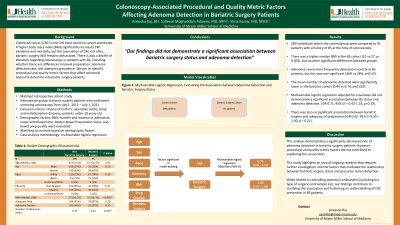Tuesday Poster Session
Category: Colorectal Cancer Prevention
P3822 - Colonoscopy-Associated Procedural and Quality Metric Factors Affecting Adenoma Detection in Bariatric Surgery Patients
Tuesday, October 29, 2024
10:30 AM - 4:00 PM ET
Location: Exhibit Hall E

Has Audio
- AR
Aneesha Raj, BS
University of Miami Miller School of Medicine
Miami, FL
Presenting Author(s)
Aneesha Raj, BS1, Saltenat Moghaddam Adames, MD, MPH2, Shria Kumar, MD, MSCE1
1University of Miami Miller School of Medicine, Miami, FL; 2The University of Texas MD Anderson Cancer Center, Houston, TX
Introduction: Colorectal cancer (CRC) is the 3rd most common cancer worldwide. A higher body mass index (BMI) significantly increases CRC incidence and mortality, but the association of CRC risk after bariatric surgery (BS) remains obfuscated. There is also a dearth of literature regarding colonoscopy in patients with BS, including whether there are differences in bowel preparation, adenoma detection rate, and adenoma prevalence. We aim to identify procedural and quality metric factors that affect colorectal adenoma detection in bariatric surgery patients.
Methods: We performed a matched retrospective cohort study of bariatric surgery patients who underwent a screening colonoscopy from July 1, 2011 - July 1, 2021. Patients with a history of Crohn’s, ulcerative colitis, celiac and malabsorption diseases, and patients under 18 years old were excluded from the study. Demographic factors, BMI, number and location of adenomas, scope withdrawal time, Boston Bowel Preparation Score, and bowel prep quality were evaluated. Matching to controls was done based on demographic factors. A multivariable logistic regression analysis including all covariates was conducted to analyze the data.
Results: A total of 289 individuals within the control group were compared to 91 patients with a history of BS at the time of colonoscopy. There was a higher median BMI in the BS cohort (31 vs 27, p< 0.001), but no other significant differences between groups. Adenomas were more frequently detected in control vs BS patients, but this was non-significant (36% vs 28%, p=0.15). The mean number of adenomas detected were significantly lower in the bariatric cohort (0.44 vs 0.74, p=0.032). Multivariable logistic regression adjusted for covariates did not demonstrate a significant association between BS status and adenoma detection. (OR 0.71, 95% CI = 0.42-1.19, p=0.19).
Discussion: This analysis demonstrates a significantly decreased rate of adenoma detection in bariatric surgery patients. However, procedural and quality metric factors did not contribute to explaining this association. This study highlights an area of ongoing research that requires further investigation into the factors that modulate the relationship between bariatric surgery status and precursor lesion detection. While limited in controlling potential confounders (including the type of surgery) and sample size, our findings contribute to clarifying this association and furthering an understanding of CRC prevention in BS patients.
Disclosures:
Aneesha Raj, BS1, Saltenat Moghaddam Adames, MD, MPH2, Shria Kumar, MD, MSCE1. P3822 - Colonoscopy-Associated Procedural and Quality Metric Factors Affecting Adenoma Detection in Bariatric Surgery Patients, ACG 2024 Annual Scientific Meeting Abstracts. Philadelphia, PA: American College of Gastroenterology.
1University of Miami Miller School of Medicine, Miami, FL; 2The University of Texas MD Anderson Cancer Center, Houston, TX
Introduction: Colorectal cancer (CRC) is the 3rd most common cancer worldwide. A higher body mass index (BMI) significantly increases CRC incidence and mortality, but the association of CRC risk after bariatric surgery (BS) remains obfuscated. There is also a dearth of literature regarding colonoscopy in patients with BS, including whether there are differences in bowel preparation, adenoma detection rate, and adenoma prevalence. We aim to identify procedural and quality metric factors that affect colorectal adenoma detection in bariatric surgery patients.
Methods: We performed a matched retrospective cohort study of bariatric surgery patients who underwent a screening colonoscopy from July 1, 2011 - July 1, 2021. Patients with a history of Crohn’s, ulcerative colitis, celiac and malabsorption diseases, and patients under 18 years old were excluded from the study. Demographic factors, BMI, number and location of adenomas, scope withdrawal time, Boston Bowel Preparation Score, and bowel prep quality were evaluated. Matching to controls was done based on demographic factors. A multivariable logistic regression analysis including all covariates was conducted to analyze the data.
Results: A total of 289 individuals within the control group were compared to 91 patients with a history of BS at the time of colonoscopy. There was a higher median BMI in the BS cohort (31 vs 27, p< 0.001), but no other significant differences between groups. Adenomas were more frequently detected in control vs BS patients, but this was non-significant (36% vs 28%, p=0.15). The mean number of adenomas detected were significantly lower in the bariatric cohort (0.44 vs 0.74, p=0.032). Multivariable logistic regression adjusted for covariates did not demonstrate a significant association between BS status and adenoma detection. (OR 0.71, 95% CI = 0.42-1.19, p=0.19).
Discussion: This analysis demonstrates a significantly decreased rate of adenoma detection in bariatric surgery patients. However, procedural and quality metric factors did not contribute to explaining this association. This study highlights an area of ongoing research that requires further investigation into the factors that modulate the relationship between bariatric surgery status and precursor lesion detection. While limited in controlling potential confounders (including the type of surgery) and sample size, our findings contribute to clarifying this association and furthering an understanding of CRC prevention in BS patients.
Disclosures:
Aneesha Raj indicated no relevant financial relationships.
Saltenat Moghaddam Adames indicated no relevant financial relationships.
Shria Kumar indicated no relevant financial relationships.
Aneesha Raj, BS1, Saltenat Moghaddam Adames, MD, MPH2, Shria Kumar, MD, MSCE1. P3822 - Colonoscopy-Associated Procedural and Quality Metric Factors Affecting Adenoma Detection in Bariatric Surgery Patients, ACG 2024 Annual Scientific Meeting Abstracts. Philadelphia, PA: American College of Gastroenterology.
